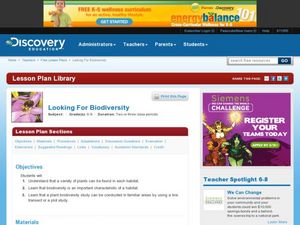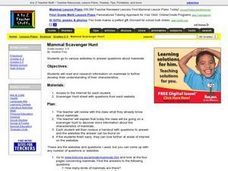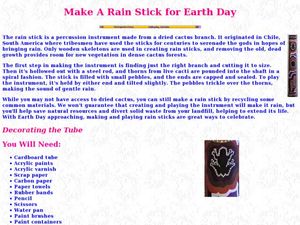Curated OER
The Coast is Clear
For this environmental worksheet, students become aware of the animals that inhabit the sea coast by reading a paragraph and coloring the picture. Students learn the importance of keeping beaches clean.
Curated OER
Bird Feeding and Migration Observation
Students research bird migration and build a bird house. In this bird lesson plan, students research the birds in their area and where they migrate to. They also build their own bird house and record data on what kinds of birds come to...
Curated OER
Features of Shells
Students create a new shell. In this shell features lesson, students different types of shells, discuss their special features and talk about how animals use shells. Students use the Internet to research information on shells and then...
Curated OER
Basic Knowledge of Big Cats
First graders create a KWL chart on big cats. In this animal science lesson, 1st graders brainstorm what they already know about big cats and research big cats using various suggested websites. Students fill in the last column of the KWL...
Curated OER
African American Traditions: Cameroonian and African-American Folktales
Young scholars compare Cameroonian and African-American folktales. In this folktales lesson plan, students participate in a jigsaw activity that requires them to read "The Owl Never Sleeps as Night," "Why the Lizard Often Nods," "Tappin,...
Curated OER
Being a Host at This Party Is No Fun
Students define what it means to be a host of an infectious disease. In this host lesson plan, students explore and explain how a host relates to the Epidemiologic Triangle and read and discuss how the host works.
Curated OER
How Much of Each Nutrient Does Your Body Need, and How Can You Find Out What Is In Each Food?
Fifth graders practice reading food labels to find nutrients in foods. In this health lesson, 5th graders read food labels and discuss the recommended daily allowance of each nutrient. They compare this to the food pyramid and create a...
Curated OER
Looking for Biodiversity
Pupils explore habitats and see that there are a variety of plants that can be found and that biodiversity is an important characteristic. For this biodiversity lesson students complete an activity that explains how to perform a plant...
Curated OER
Life Cycle of Brassica Plants: Planting Seeds
Students explore botany by participating in a calendar class activity. In this plant observation lesson plan, students examine a diagram of a Brassica plant and identify its anatomy before planting their own seeds and viewing the changes...
Curated OER
Look at Those Seeds Grow!
Students explore plant science by participating in a botany activity. In this seed growth lesson, students identify the necessary elements to ensure a plant grows well and prepare seeds for planting. Students plant their soaked seeds in...
Curated OER
Mammal Scavenger Hunt
Students use the internet to answer their questions about mammals. They complete a scavenger hunt worksheet to identify their characteristics. They ask any questions they have at the end of the lesson.
Curated OER
Let it Grow!
Students explain the relationship of plants and animals in the environment. They name the basic requirements for plant growth and define the terms photosynthesis, stomata, chlorophyll and xylem.
Curated OER
Is It Alive?
First graders explore living things and their habitats. They create an original It's Alive! book to demonstrate what they have learned.
Curated OER
Thematic Unit on Cats
Students discover in which climates the cats of the world live in. They review the different climates of the world and use maps and globes to help them locate continents.
Curated OER
Australia
Students participate in activities in which they discover facts about Australia. They examine its climate and history. They complete a worksheet to end the lesson.
Curated OER
Ecoregions of Texas
Students map the ecoregions in Texas and illustrate the vegetation native to the region. They will use their maps to investigate why prehistoric hunter-gatherers might have decided to live in one area over another, such as the ancient...
Curated OER
Ecoregions of Texas
Seventh graders discuss why hunter-gatherers might have favored certain areas in which to live. In pairs, they research specific regions to examine in depth. Students present their eco-region vegetation findings (in this case Central...
Curated OER
Fossil Fuels-Importance and Formation
Student is introduced to the concept of energy as a common factor among all things. They list three fossil fuels and describe how fossil fuels were formed. They then tell how much plant debris it took to form one foot of coal.
Curated OER
Wildlife on the African Savanna
Second graders discuss African Savanna, choose and illustrate example of wildlife that is found in the Savanna, and write paragraph describing wildlife they chose to draw.
Curated OER
The Rainforest
Second graders investigate the five different layers of the rainforest. They conduct research to find details pertaining to the animals and the interactions of the existing food chain in each layer of the forest. Students construct a...
Curated OER
Just Graph It!
Students practice collecting data and organizing it into graphs. As a class, they collect birthday information from each of their classmates. To continue practicing, they examine the characteristics of different bugs and zoo animals. ...
Curated OER
Animal Adaptations: Focus on Bird Beaks
Sixth graders explore bird beaks as animal adaptation. In this bird adaptation lesson, 6th graders conduct an experiment to determine the connection between the shape of a bird's beak and the food it eats.
Curated OER
Make a Rain Stick for Earth Day
Students construct rain sticks. In this ecology multicultural lesson, students use recyclable items to construct a rainstick. Detailed instructions for making and decorating the rainstick are given.
Curated OER
Falling Leaves
Students create a painting of falling leaves. In this art lesson, students collect fallen leaves and paint over them using tempera or water color paint to make an outline. Students continue painting the leaves until their paper is...

























